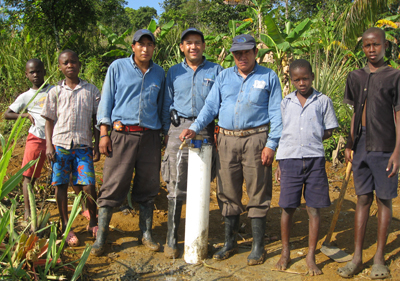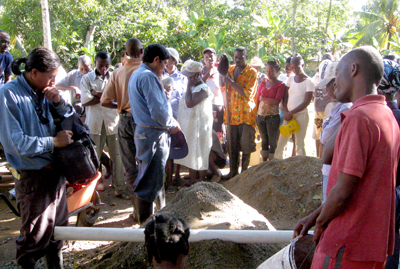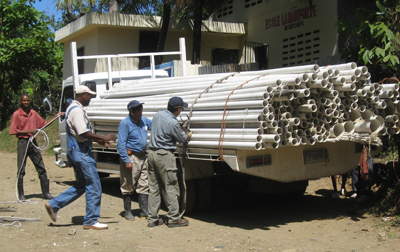 |
| Left to right: Two Haitian boys; Caiza's son, Edison; César Cortez; Caiza's father, Francisco; two other Haitian boys. |
(Nov. 23, 2012 - by Ralph Kurtenbach) Death was on the table for discussion as César Cortez, a water engineer, came into a meeting of leaders in La Bruyère.
Fortunately, Cortez found people ready for positive change through a faith-based effort to build a clean water system for the community in northern Haiti southwest of Cap-Haitien.
Cholera, accompanied by diarrhea and other symptoms, is a disease long faded from media headlines about Haiti. However, it still stalks Haitians, killing them by dehydration. "The cholera has been mutating," Cortez explained, "It's a different kind. For the rest of the world you cannot see anything [on this topic] in the news anymore, but daily, people are still dying." This health threat in La Bruyère has created a push to complete the clean-water project begun earlier this year.
However, Cortez, a missionary with HCJB Global, sees another motivation. "One that is pulling them is the future, the hope that they can do a better job and make a better future," he said. "The first time I visited them, they told me, 'We need direction; we need tools-knowledge and tools and that's it. And we can do it.'"
Worldwide, unsafe drinking water, along with short supply of water for hygiene and poor access to sanitation, together contribute to about 88 percent of deaths from diarrheal diseases, according to the Centers for Disease Control (CDC). Improved water sources reduce deaths from diarrhea by 21 percent whereas improved sanitation reduces diarrhea morbidity by 37.5 percent. Furthermore, the simple act of washing hands at critical times can reduce the number of diarrhea cases by as much as 35 percent, reported the Atlanta-based agency.
 |
| Edison and Francisco Caiza, pictured at the beginning of a work day in March 2012, start by praying with local residents. |
A Haitian pastor, Dorlean Elius, served as interpreter during the meeting on Thursday, Oct. 25, convened to evaluate people's collective response to a fee-based water service in La Bruyère. Even though the community only charges the equivalent of about 1 cent per cubic meter of water, Cortez points out that proper financial management is critical for the water system to be self-sustaining.
"The issue is not cost; the issue is attitude," Cortez said, revealing his community development ideal emphasizing local initiative and responsibility. One objective of the trip last March was to review receipts he'd provided La Bruyère's community leaders to fill out and file as people paid their water bills.
"Receipts and a ledger were presented and a summary of the total fees collected," recounted Cortez. "All values are in the national currency, the gourde. The money is maintained and managed by the water system expenditures committee."
Cortez's report-factual and informative-quietly illustrated the success of collecting from 300 families in a poor community, then safeguarding it. "They brought me a box with all the money that they'd paid up to this time," Cortez recalled, saying he'd cautioned La Bruyère's leaders against keeping the cash on hand. He said they told him, "No, in this community it is completely safe; that's no problem."
 |
|
Tubing for the water project in La Bruyère that was trucked from neighboring Dominican Republic in March 2012. |
Another ministry goal of Cortez's team is transformation that transcends physical needs. "They are watching as their own are dying, and not just dying physically but spiritually too," he said. "It's one of the main areas of voodoo in the country, and they can see a difference between that and Christianity."
Accompanying Cortez to Haiti in March were Francisco Caiza and his son, Edison, water technicians with Vozandes Community Development in Ecuador. Years ago the Caizas and other families began benefiting from a water distribution system their highlands community in Ecuador's highlands.
Cortez integrates water engineering into his work at HCJB Global. He said of his recent trip, "I had a chance to talk with two pastors and the people. They let me preach. The attitude, the desire to continue working was really good." Even though he finds the work challenging, he's already planning to return to La Bruyère in early 2013.
Source: HCJB Global
